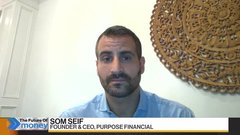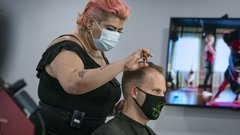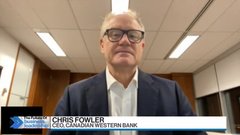Oct 5, 2020
First-hand accounts of what racism looks like in Corporate Canada
By Anne Gaviola
First-hand accounts of racism in Corporate Canada
Over the span of more than two-and-a-half years working on live events and music projects at Canada’s largest bank, Amara Nwogu’s dream job turned into a burden she says she could no longer bear.
She says she left her position within Royal Bank of Canada’s brand marketing team in April after a series of dealings with a senior manager and frustrating failed attempts to remedy the situation with the company’s human resources department.
“I’ve worked at other places before and I’ve never had these issues. Anyone who has worked with me will tell you how serious I am, that I don’t take offense to a lot of things. I’m not a weak person. I know my truth,” Nwogu said in a telephone interview with BNN Bloomberg.
Nwogu recently detailed her ordeal in an article on Medium, in which she describes being Black in Corporate Canada as an experience that broke her spirit at age 29.
Stories like Nwogu’s are all too common, according to Laura Williams, lawyer and founder of Williams HR Law Professional Corporation, which specializes in labour and employment issues.
In a phone interview, Williams said corporations and institutions across Canada are “not equipped” to deal with systemic racism complaints and allegations, which is why problems remain unresolved. She says dealing with issues of diversity, equity and inclusion are complicated because the law and workplace policies don’t always capture the seemingly subtle nature of microaggressions, which are actions regarded as indirect or unintentional discrimination against members of a marginalized group. She says this is a big reason why many, like Nwogu, opt out of Corporate Canada.
Since the death of George Floyd, an unarmed Black man, in May at the hands of Minneapolis police, global protests have forced many facets of Canadian society to take a hard look at societal racism.
In recent months, leaders within Corporate Canada have taken bold anti-racism stands, committing to combat widespread discrimination that disadvantages Black employees and other visible minorities. But Williams says there remains a disconnect between these public statements and the internal work that needs to be done to ensure that a company’s own procedures are truly anti-racist – especially when dealing with unconscious bias manifested in small ways which, over time, can take an emotional toll on the person on the receiving end of it.
According to Williams, “ramrodding” new workplace rules is ineffective and there is no “quick fix” when it comes to changing attitudes and perceptions. Williams says that a failure to do this will result in continuing difficulty retaining Black talent in Corporate Canada.

Leaving Corporate Canada
Nwogu says she was a child of abuse, who left home at age 23 to live in a shelter. She studied politics and social justice in school and went on to work on special projects and policy matters for Toronto mayor John Tory.
She parlayed that experience into a position at RBC where Nwogu says her mandate was to introduce the bank to a younger, more diverse crowd of potential clients and to shake up the bank’s “elitist image.”
According to Nwogu, she was subjected to a stream of microaggressions from her senior manager who repeatedly, in emails and in person, referred to her by the name of another woman — who is also Black — but did not work at the bank. Her attempts to correct this verbally and in an email didn’t solve the problem.
“I replied in capital letters ‘THIS IS AMARA’ and 10 exclamation marks. Another manager was cc’ed on that so he knew I’d had enough but it still continued,” she said.
Nwogu says the same senior manager told her that she must like the movie Black Panther because of her "personal attachment," in reference to her Nigerian roots.
She also says her senior manager indicated in a meeting about a live music event, that the team should be concerned about being involved as a sponsor because of the presence of ‘daggering,’ a West Indies style of dancing.
“I said to him: ‘We sponsor Electronic Dance Music festivals and people overdose and actually die at those.’ But he said, ‘I’ve been there, I know what it’s like.’
I then said, ‘I’ve grown up with West Indian people my whole life, I’m not sure why your experience with it outweighs mine,” Nwogu said.
She says she took her long list of alleged microaggressions and complaints to senior management and HR. Her senior manager was, after several meetings, transferred to another department in February.
BNN Bloomberg reached out several times to Nwogu’s former senior manager for a response but he declined to comment.
Nwogu said that in February, RBC’s HR department gave her the option to open a detailed formal investigation into her complaints against her senior manager, but she decided not to pursue it.
"When they do an investigation they take the manager's computer and phone, look through all their emails, that manager can't go to work—it's a huge deal. They made it very clear that it was my choice but I said I don't want to live through this again. I've already gone through this experience," she said.
Nwogu left the bank a couple of months later. None of her claims have been tested or proven in a court or other proceeding.
“It is never appropriate, in any context, for someone to encounter racist behaviour in the workplace," said RBC spokesperson Gillian McArdle in an email to BNN Bloomberg responding to Nwogu’s claims. She went on to say that in this case, when RBC received the complaint, it completed an investigation which "resulted in a number of changes" and that those outcomes were reviewed with Nwogu before taking "appropriate action."

Why many companies are incapable of policing themselves
Legal and HR expert Laura Williams also runs an HR consulting business and is a workplace investigator brought in by firms on issues related to equity, diversity and discrimination. She says the antidote to systemic racism is systemic anti-racism processes, such as the automatic launch of an investigation when serious issues are raised. This puts the onus on the HR department rather than the complainant.
However, Williams warns companies against buying into “the delusion” that they can police themselves. She says leadership is often blind to an organization’s own internal biases and trained external help is needed.
“HR may not get the nuances associated with those comments and that individual may be branded as being hypersensitive or angry, which can be another form of microaggression towards a racialized person,” Williams said.
The toll of microaggressions
A Boston Consulting Group poll from November 2019 suggests that 34 per cent of Canadians who identify as a person of colour have experienced discrimination with their current employer.
In a December 2019 study by the Environics Institute For Survey Research, one-in-five respondents reported experiencing discrimination on an ongoing basis. According to that research, which is not specific to the workplace, discrimination comes as subtle disparagement such as being mistaken for someone else or being treated as though they are not intelligent.
Casual, seemingly innocuous comments are something that Nana, who is Black, says she’s regularly subjected to. She asked to keep her identity anonymous for fear of hindering her career trajectory and requested a pseudonym because she is easily identifiable by her first name. She said in a phone interview that she experienced racism in both Toronto offices where she has worked —at an ad agency and in the music industry.
Nana says she experienced microaggressions ranging from being greeted “in terms of African-American vernacular English” despite the fact that she doesn’t speak that way, to having her braided hair touched, without her permission, by a director who was “intrigued” by the way she styled it.
“I felt at that point, I couldn’t say anything because I was in my probationary term but I was very uncomfortable and I didn’t know what to do. I told her that my braids were tight so I would rather she didn’t pull on them,” said Nana.
Nana says that for people who haven’t experienced microaggressions, they may seem trivial, but being repeatedly subjected to them is emotionally exhausting.
“It’s subtle and insidious,” she said. “It’s almost as if someone is pinching you but telling you they’re not pinching you. And everybody sees that they’re pinching you but they’re not doing anything about it. And I say pinching because it’s not like somebody’s punching you in the face. But it’s the pinching over and over that will eventually cause more bruising and hurt.”
Michael Bach, CEO of the Canadian Centre for Diversity and Inclusion, said that Nana and Nwogu’s stories share a common thread.
“It’s death by a thousand paper cuts. It wasn’t overt racism; not like people were calling her the N-word. But it’s microaggressions and micro-inequities experienced day after day that wear on you to a point where you feel you have no choice but to leave,” said Bach, who was KPMG’s first national director of diversity and inclusion, in a phone interview.
Bach says unlike other types of training, effective anti-racism programs require regular maintenance, and that the bigger the organization, the more difficult it is to ensure all departments are complying with diversity and inclusion rules.
Dahabo Ahmed Omer is the executive director of the BlackNorth Initiative, whose CEO pledge involves seven specific steps to remove barriers preventing the advancement of Black employees. To date, leaders at more than 300 companies have committed to the pledge, which includes filling 3.5 per cent of senior executive and board positions in Canada with Black leaders by 2025, and hiring at least five per cent of their student workforce from Black communities.
Ahmed Omer says there is pressure on firms to go beyond performative corporate statements denouncing racism, propelled by the momentum of the Black Lives Matter social justice movement. She added there is an opportunity for Corporate Canada to look inward and discover its role in perpetuating systemic racism.
“I’m a Black Muslim woman and I can tell you these conversations are uncomfortable but they are truly needed,” she said. “We ask them to listen to their employees and create space and opportunities for Black talent because Black talent is there, and to be honest about best practices as well as unsuccessful practices.”

RBC has not signed on to the BlackNorth pledge though it released a statement on July 6, acknowledging widespread systemic racism that has disproportionately disadvantaged the Black, Indigenous and People of Colour (BIPOC) community. RBC also pledged to invest $50 million within the next five years toward advancing the careers of BIPOC youth.
When asked about the fallout of going public with her story, Nwogu says she’s already received more than one hundred messages of support, including from former co-workers who apologized for their racist behaviour or wish they had done more to help her. One message she says from a former co-worker started out on a critical tone but the ensuing conversation resulted in her former colleague deciding to report an incident that she had previously been reluctant to bring attention to.
Nwogu added that the importance of addressing systemic racism in Corporate Canada, a topic that re-entered the spotlight after the death of George Floyd in May, outweighed the risk of being labelled a troublemaker.
“These things were happening before but people now actually care about Black lives,” she said. “I’m speaking up now because I feel safe enough to. My story will help people speak up, and be taken more seriously.”









